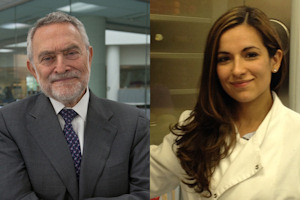Manchester scientists honoured in Biochemical Society Awards
04 Apr 2016
Professor Sir Salvador Moncada and Dr Maria Romina Girotti are among the 11 eminent scientists and exceptional early career researchers honoured in 2016

The Awards recognize molecular bioscientists for the excellence and profound impact their work has had, both for the scientific community and society in general. They also allow exceptional work by early career researchers to be highlighted.
The recipients have made cutting-edge discoveries and advances in fields ranging from microbiology to cancer research, neurochemistry, biotechnology, energy and metabolism, genes and signalling.
Professor Moncada, who took on the role of Director of the Institute of Cancer Sciences at Manchester in 2014, has been awarded The Centenary Award.
Early in his career, his work contributed to the understanding of how low doses of aspirin prevent cardiovascular episodes such as myocardial infarction and stroke. Later, he oversaw the discovery and development of drugs for use in the treatment of epilepsy, migraine and malaria, and the initiation of the project which led to the finding and development of lapatinib (anti-cancer).
In the last decade, his work has established the role of nitric oxide (NO) as a physiological regulator of cell respiration and a cell signalling molecule in response to stress. His recent finding that NO is involved in mitochondrial biogenesis has implications for the understanding of metabolic syndrome, type-2 diabetes and obesity.
His interest in glycolysis has led to research which has significant implications for the understanding of normal and abnormal cell proliferation, for example in cancer.
His research has had a major impact, as shown by his standing in the international citation indexes and his acknowledgement as the most cited UK scientist in biomedicine in the 1990s. In 2010 he received a Knighthood from Her Majesty the Queen in recognition of his services to Science.
Professor Moncada said: “I am extremely honoured and delighted to receive the Centenary Award from the Biochemical Society, one of the most prestigious scientific society in the country.”
Dr Maria Romina Girotti, of the Cancer Research UK Manchester Institute, has been awarded The Early Career Research Award – Signalling.
Romina joined the Molecular Oncology Group at the Cancer Research UK Manchester Institute in 2012 and has specialized in translational medicine in melanoma. Under the mentorship of Professor Richard Marais, she achieved an outstanding track record of publications in high impact factor journals.
Her work has provided crucial insights into the molecular mechanisms underlying resistance to targeted therapies in melanoma, the development of new therapeutics to treat resistant patients in collaboration with the Institute of Cancer Research and new technologies for personalized medicine in melanoma patients. As a result of this research, a Phase-I clinical trial started in April 2015 at the Royal Marsden Hospital and at The Christie Hospital in the UK.
Romina said: “I am absolutely thrilled to receive this award. I would like to thank my supervisor Professor Richard Marais for nominating me and for being such an amazing mentor. To work in his team is a privilege one and certainly one of the most important steps in my scientific career”.
Professor Anne Dell, Chair of the Awards Committee, said: “The Biochemical Society's Awards allow the excellent work of high calibre scientists at all stages of their careers to be recognised and rewarded. The 2017 Award lecture series will showcase the outstanding contributions to molecular bioscience that the winners have made during their careers”.
All of the award prizes and medal lectureships will take place in 2017 and all award winners will be invited to submit an article to a Society-owned publication.
Further information
